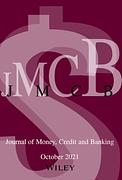Macroprudential Policy Coordination in a Currency Union
August 01, 2021





Agénor P-R., Gambacorta L., Kharroubi E., Lombardo G., Pereira da Silva L. (2021) Assessing the Gains from International Macroprudential Policy Cooperation, Journal of Money, Credit, and Banking, vol. 53, pp. 1819-66.